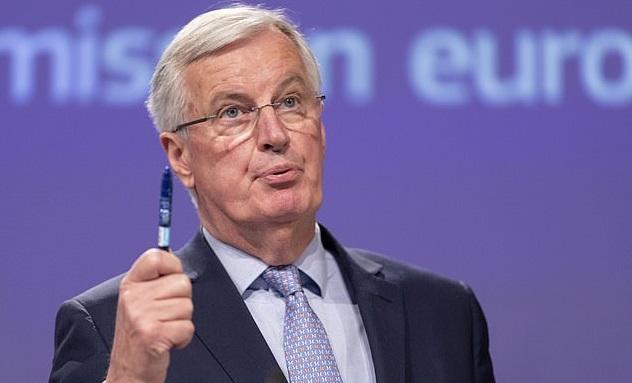Eleven years before the joint construction of the Wuhan Institute of Virology, French intelligence services warned Paris that China's reputation for poor bio-security could lead to a 'catastrophic leak,' according to the Daily Mail.
In 2004, the EU's chief brexit negotiator, Michael Barnier, ignored those warnings - signing off on the lab's construction when he was the French foreign minister.
According to the report, French intel also warned that Paris could lose control of the facility, and that Beijing could even use it to make biowarfare weapons. And in 2015, as the laboratory prepared to open, those concerns were realized after the French architects of the project said the CCP had shut them out. In fact, 50 French scientists were supposed to help the Chinese run the laboratory properly, but never ended up going.
The Mail discovered Barnier's involvement in the Wuhan Institute of Virology during an in-depth investigation into French connections to the lab - where many believe the coronavirus escaped from, as the WIV housed a group of scientists who received international condemnation for creating chimeric strains that could infect humans. Under the 'escaped' scenario, an infected WIV employee unknowingly brought it into the Wuhan wet market, exposing what would become roughly half of the first known cluster of cases.
Biologists who carried out a landmark study say they were ‘surprised’ to find the virus was ‘already pre-adapted to human transmission’.Jacques Chirac, the French president at the time of the deal, pushed for the Wuhan institute to be set up after the 2003 SARS outbreak, which affected 26 countries and resulted in more than 8,000 cases and 774 deaths. Mr Chirac, along with his pro-Beijing prime minister Jean-Pierre Raffarin, promised French funding and expertise in return for a share of the intellectual copyright on the lab’s discoveries. -Daily Mail
France's Chirac government saw the deal to construct the WIV as a way to strengthen trade with China, despite warnings from its own intelligence, the French equivalent to MI6, which repeatedly raised concerns over lack of international control and 'transparency' issues.
"What you have to understand is that a P4 [high-level bio-security] laboratory is like a nuclear reprocessing plant. It’s a bacteriological atomic bomb," said one source, adding: "The viruses that are tested are extremely dangerous – diving suits, decontamination airlocks etc must be followed to the letter."
Alain Merieux, the French billionaire who was instrumental in setting up the Wuhan laboratory in partnership with his Institut Merieux in Lyons, abandoned the project in 2015, saying: ‘I am giving up the co-chairmanship of [the] P4 [laboratory], a Chinese tool. It belongs to them, even if it was developed with technical assistance from France.’According to Le Figaro, a diplomat with a close knowledge of the deal added: ‘We knew the risks involved and thought that the Chinese would control everything and quickly eject us from the project.‘We believed that providing this cutting-edge technology to a country with an endless power agenda would risk exposing France in return.’ -Daily Mail
And in 2015, concerns were validated after China implemented their new policy of 'dual use' technologies, which allows for the military use of civilian technology.
"The aim was to develop vaccines following the SARS crisis between 2002 and 2004," said the Mail's source. "There was much co-operation on a range of issues between France and China at the time, and Michel Barnier was implementing government policy."
"The issue of bio-security was certainly a cause for concern within agencies including the DGSE," the source added.
Meanwhile, the WIV's Shi Zhengli - known as "bat woman" for her controversial experiments creating bat coronaviruses that can infect humans - and who swore 'on her life' that the COVID-19 isn't from her lab, said in a recent interview on Chinese state television that viruses being discovered now are "just the tip of the iceberg."
"If we want to prevent human beings from suffering from the next infectious disease outbreak, we must go in advance to learn of these unknown viruses carried by wild animals in nature and give early warnings," Shi told CGTN, adding "If we don’t study them there will possibly be another outbreak."
Will be, or won't be another outbreak?
